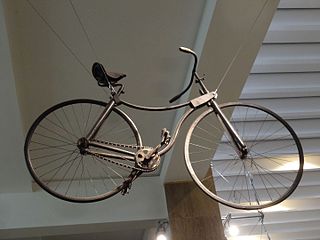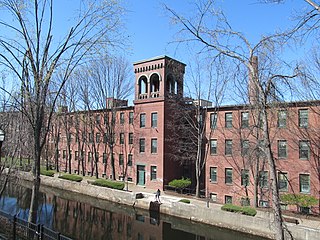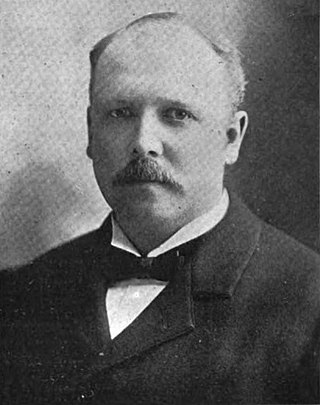
Chicopee is a city located on the Connecticut River in Hampden County, Massachusetts, United States. At the 2020 census, the city had a population of 55,560, making it the second-largest city in western Massachusetts after Springfield. Chicopee is part of the Springfield, Massachusetts Metropolitan Statistical Area. The communities of Chicopee Center (Cabotville), Chicopee Falls, Willimansett, Fairview, Aldenville, Burnett Road, Smith Highlands and Westover are located within the city.
The Locomobile Company of America was a pioneering American automobile manufacturer founded in 1899, and known for its dedication to precision before the assembly-line era. It was one of the earliest car manufacturers in the advent of the automobile age. For the first two years after its founding, the company was located in Watertown, Massachusetts. Production was transferred to Bridgeport, Connecticut, in 1900, where it remained until the company's demise in 1929. The company manufactured affordable, small steam cars until 1903, when production switched entirely to internal combustion-powered luxury automobiles. Locomobile was taken over in 1922 by Durant Motors and eventually went out of business in 1929. All cars produced by the original company were always sold under the brand name Locomobile.

The Brass Era is an American term for the early period of automotive manufacturing, named for the prominent brass fittings used during this time for such features as lights and radiators. It is generally considered to encompass 1896 through 1915, a time when cars were often referred to as horseless carriages.

A safety bicycle is a type of bicycle that became very popular beginning in the late 1880s as an alternative to the penny-farthing and is now the most common type of bicycle. Early bicycles of this style were known as safety bicycles because they were noted for, and marketed as, being safer than the high wheelers they were replacing. Even though modern bicycles use a similar design, the term is rarely used today and is considered obsolete outside circles familiar with high wheelers.

Charles Edgar Duryea was an American engineer. He was the engineer of the first working American gasoline-powered car and co-founder of Duryea Motor Wagon Company. He was born near Canton, Illinois, a son of George Washington Duryea and Louisa Melvina Turner, and died in Philadelphia, Pennsylvania, but spent most of his life working in Springfield, Massachusetts. It was in Springfield that Charles and his brother, Frank, produced and road-tested America’s first gasoline-powered car.

The Knox Automobile Company was a manufacturer of automobiles in Springfield, Massachusetts, United States, between 1900 and 1914. Knox also built trucks and farm tractors until 1924. They are notable for building the very first modern fire engine in 1905, and the first American vehicle with hydraulic brakes, in 1915.

Stevens-Duryea was an American manufacturer of Veteran and Brass Era automobiles in Chicopee Falls, Massachusetts, between 1901 and 1915 and Vintage Cars from 1919 to 1927.

Thomas Buckland Jeffery was a British emigrant to the United States who co-founded the Gormully & Jeffery company which made the Rambler bicycle. He invented the "clincher" rim which was widely used to fit tires to bicycles and early automobiles, and in 1900 established the Thomas B. Jeffery Company to make automobiles, again using Rambler branding.

Spalding is an American sports equipment manufacturing company. It was founded by Albert Spalding in Chicago in 1876 as a baseball manufacturer, and is today headquartered in Bowling Green, Kentucky. It sells softballs through its subsidiary Dudley Sports. In the past, Spalding has manufactured balls for other sports, including American football, soccer, volleyball, tennis, and golf.

Pope Manufacturing Company was founded by Albert Augustus Pope around 1876 in Boston, Massachusetts, US and incorporated in Hartford, Connecticut in 1877. Manufacturing of bicycles began in 1878 in Hartford at the Weed Sewing Machine Company factory. Pope manufactured bicycles, motorcycles, and automobiles. From 1905 to 1913, Pope gradually consolidated manufacturing to the Westfield Mass plant. The main offices remained in Hartford. It ceased automobile production in 1915 and ceased motorcycle production in 1918. The company subsequently underwent a variety of changes in form, name and product lines through the intervening years. To this day, bicycles continue to be sold under the Columbia brand.

The bike boom or bicycle craze is any of several specific historic periods marked by increased bicycle enthusiasm, popularity, and sales.

American Bicycle Company (1899-1903) was an American bicycle company (Trust) led by Albert Augustus Pope. The company was formed to consolidate the manufacturers of bicycles and bicycle parts. In the 1890s the advancements in bicycle design led to unprecedented demand for the new Safety bicycles. The "American Bicycle Company" trust only lasted for three years.

Freelan Oscar Stanley was an American inventor, entrepreneur, hotelier, and architect. He made his fortune in the manufacture of photographic plates but is best remembered as the co-founder, with his brother Francis Edgar Stanley, of the Stanley Motor Carriage Company which built steam-powered automobiles until 1920. He also built and operated the Stanley Hotel in Estes Park, Colorado.

The Riker was a veteran and brass era electric car founded in 1898 in Elizabeth, New Jersey. Designed by Andrew L. Riker, they were built in small numbers until the company was absorbed by the Electric Vehicle Company in 1901.

The Metz Company was a pioneer brass era automobile maker established by Charles Herman Metz in Waltham, Massachusetts, from 1909 to 1922.

Ames Manufacturing Company was a manufacturer of swords, tools, and cutlery in Chicopee, Massachusetts, as well as an iron and bronze foundry. They were a significant provider of side arms, swords, light artillery, and heavy ordnance for the Union in the American Civil War. They also cast several bronze statues, which can be found throughout New England.
Victor Steam was an American automobile company started in 1899. They made steam powered vehicles.

George R. Bidwell was a pioneering American bicycle salesman and manufacturer. Active in politics as a Republican, from July 14, 1897, to April 3, 1902, he was Collector of the Port of New York.

Western Wheel Works was a Chicago bicycle company started by Adolph Schoeninger in 1866. It was one of the largest bicycle makers in the world. In 1899 it joined a trust which controlled 95 percent of the bicycle manufacturing market.

Indiana Bicycle Company was a bicycle and automobile company in Indianapolis, Indiana, United States. The company made carriages, bicycles and electric vehicles under the name Waverley Cycles. By 1896 the company was producing 350 bicycles every ten hours.
































